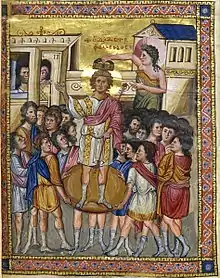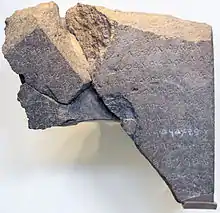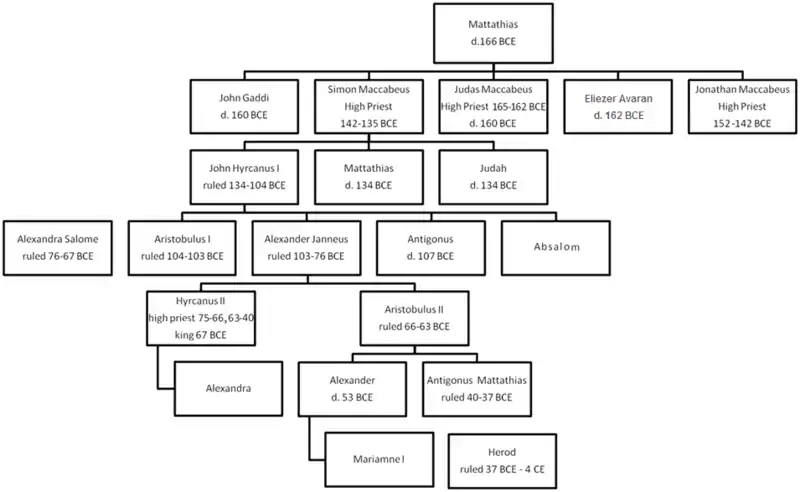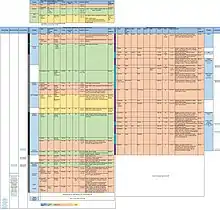Kings of Israel and Judah
This article is an overview of the kings of the United Kingdom of Israel as well as those of its successor states and classical period kingdoms ruled by the Hasmonean dynasty and Herodian dynasty.

| Part of a series on |
| Kings of Israel and Judah |
|---|
 |
|
(Italics indicate a disputed |
In contemporary scholarship, the united monarchy is debated, due to a lack of archaeological evidence for it. It is generally accepted that a "House of David" existed, but many believe that David could have only been the king or chieftain of Judah, which was likely small, and that the northern kingdom was a separate development. There are some dissenters to this view, including those who support the traditional narrative.[1][2][3][4]
Family tree

| Family tree | |||||||||||||||||||||||||||||||||||||||||||||||||||||||||||||||||||||||||||||||||||||||||||||||||||||||||||||||||||||||||||||||||||||||||||||||||||||||||||||||||||||||||||||||||||||||||||||||||||||||||||||||||||||||||||||||||||||||||||||||||||||||||||||||||||||||||||||||||||||||||||||||||||||||||||||||||||||||||||||||||||||||||||||||||||||||||||||||||||||||||||||||||||||||||||||||||||||||||||||||||||||||||||||||||||||||||||||||||||||||||||||||||||||||||||||||||||||||||||||||||||||||||||||||||||||||||||||||||||||||||||||||||||||||||||||||||||||||||||||||||||||||||||||||||||||||||||||||||||||||||||||||||||||||||||||||||||||||||||||||||||||||||||||||||||||||||||||||||||||||||||||||||||||||||||||||||||||||||||||||||||||||||||||||||||||||||||||||||||||||||||||||||||||||||||||||||||||||||||||||||||||||||||||||||||||||||||||||||||||||||||||||||||||||||||||||||||||||||||||||||||||||||||||||||||||||||||||||||||||||||||||||||||||||||||||||||||||||||||||||||||||||||||||||||||||||||||||||||||||||
| |||||||||||||||||||||||||||||||||||||||||||||||||||||||||||||||||||||||||||||||||||||||||||||||||||||||||||||||||||||||||||||||||||||||||||||||||||||||||||||||||||||||||||||||||||||||||||||||||||||||||||||||||||||||||||||||||||||||||||||||||||||||||||||||||||||||||||||||||||||||||||||||||||||||||||||||||||||||||||||||||||||||||||||||||||||||||||||||||||||||||||||||||||||||||||||||||||||||||||||||||||||||||||||||||||||||||||||||||||||||||||||||||||||||||||||||||||||||||||||||||||||||||||||||||||||||||||||||||||||||||||||||||||||||||||||||||||||||||||||||||||||||||||||||||||||||||||||||||||||||||||||||||||||||||||||||||||||||||||||||||||||||||||||||||||||||||||||||||||||||||||||||||||||||||||||||||||||||||||||||||||||||||||||||||||||||||||||||||||||||||||||||||||||||||||||||||||||||||||||||||||||||||||||||||||||||||||||||||||||||||||||||||||||||||||||||||||||||||||||||||||||||||||||||||||||||||||||||||||||||||||||||||||||||||||||||||||||||||||||||||||||||||||||||||||||||||||||||||||||||
List of kings
The Bible describes a succession of kings of a united kingdom, and then of divided kingdoms.[1]
House of Saul

According to the Bible, the Tribes of Israel lived as a confederation under ad hoc charismatic leaders called judges. In around 1020 BCE, under extreme threat from foreign peoples, the tribes united to form the first United Kingdom of Israel. Samuel anointed Saul from the Tribe of Benjamin as the first king.
- Saul (1020–1000 BCE)
- Ish-bosheth (Esbaal) (1000–991 BCE)
House of David

- David (c. 1003–970 BCE) – made Jerusalem the capital of Israel.
- Adonijah (pretender, c. 970 BCE)
- Solomon (c. 970–930 BCE)
- Rehoboam (c. 930–915 BCE)
After Rehoboam reigned three years,[6] the United Kingdom of Israel was divided in two – the northern Kingdom of Israel under Jeroboam, with its capital, first in Shechem, then Penuel, Tirzah, and finally Samaria, and ruled by a series of dynasties beginning with Jeroboam; and the southern Kingdom of Judah with its capital still in Jerusalem and ruled by the House of David. Under Hezekiah’s rule in the Kingdom of Judah, the Neo-Assyrian Empire conquered and destroyed the northern kingdom 722 BCE leaving only the southern kingdom of Judah.
No Dynasty
No Dynasty
- Tibni (pretender)
Fourth Dynasty
No dynasty
No dynasty
No dynasty
House of David (cont.)
House of David (restored)
- Jehoash (r. 836–796 BCE)
- Amaziah (r. 796–767 BCE)
- Uzziah (r. 767–750 BCE)
- Jotham (r. 750–735 BCE)
- Ahaz (r. 735–716 BCE)
- Hezekiah (r. 729/716 – 697/687 BCE)
- Manasseh (r. 697/687–643 BCE)
- Amon (r. 643–640 BCE)
- Josiah (r. 640–609 BCE)
- Jehoahaz (r. 609 BCE)
- Jehoiakim (r. 609–598 BCE)
- Jeconiah (r. Dec 9, 598– March 15, 597 BCE)
- Zedekiah (r. 597–586 BCE)
Hasmonean dynasty

- Aristobulus I (r. 104–103 BCE)
- Alexander Jannaeus (r. 103–76 BCE)
- Salome Alexandra (Queen, r. 76–67 BCE)
- Aristobulus II (r. 67–63 BCE)
- Hyrcanus II (r. 63–40 BCE)
- Antigonus II Mattathias (r. 40–37 BCE)
Herodian dynasty
- Herod the Great (r. 37–4 BCE)
- Herod Agrippa (r. 41–44 CE)
Table on the Kings

See also
References
- Lipschits, Oded (2014). "The history of Israel in the biblical period". In Berlin, Adele; Brettler, Marc Zvi (eds.). The Jewish Study Bible (2nd ed.). Oxford University Press. ISBN 978-0-19-997846-5.
The promonarchic period long ago became a literary description of the mythological roots, the early beginnings of the nation, and the way to describe the right of Israel on its land. The archeological evidence also does not support the existence of a united monarchy under David and Solomon as described in the Bible, so the rubric of "united monarchy" is best abandoned, although it remains useful for discussing how the Bible views the Israelite past.
- Finkelstein, Israel; Silberman, Neil Asher (2001). The Bible Unearthed: Archaeology's New Vision of Ancient Israel and the Origin of its Stories. New York: Simon & Schu. ISBN 0-684-86912-8.
- Kuhrt, Amélie (1995). The Ancient Near East, c. 3000-330 BC, Band 1. New York: Routledge. p. 438. ISBN 978-0-41516-762-8.
- Wright, Jacob L. (July 2014). "David, King of Judah (not Israel)". The Bible and Interpretation.
- Judges 9:6
- 2 Chronicles 11:17
External links
- King at the Jewish Encyclopedia
- Kings of the Jews at Project MUSE
- Kings of the Jews: Israel, Judah, Hasmoneans & Herodians at The Algemeiner